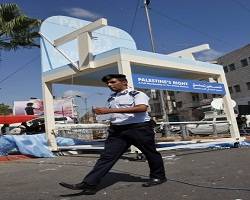The Palestinians have came under intense pressure to drop a bid for UN membership as diplomats worked behind the scenes to head off a looming clash.
Riyad al-Maliki, Palestinian foreign minister, said he was "amazed" by the US efforts to persuade other countries to not to support the Palestinian bid.
"They have used different forms of pressure, threats, and many others, sending letters, sending ambassadors, etcetera, etcetera... Amazing," he told Al Jazeera on Tuesday.
The White House has said President Barack Obama would meet with Palestinian leader Mahmoud Abbas on Wednesday, after talks with Israeli Prime Minister Binyamin Netanyahu.
The US has been leading the drive to stop the Palestinians submitting their application for full UN membership on Friday as threatened, and has vowed to veto any such bid to the UN Security Council.
"I hope that the United States will change its position and follow the majority of countries which want to support the Palestinian right to self-determination and an independent state," Maliki said.
He reaffirmed the Palestinians will seek Security Council recognition of an independent Palestinian state, and said they believed they could win the necessary votes of nine of the council's 15 members.
Israel has slammed the move as a bid to circumvent the 'peace talks' that ground to a halt a year ago after Israel refused to extend a moratorium on settlement building.
Before leaving for New York, Netanyahu said "the path to peace is through dialogue and not through unilateral declarations". He has also called on Abbas to open up direct talks in New York and resume them in Jerusalem and Ramallah.
In response, Abbas told Fox News television that he would "meet any Israeli official any time" but said there would be no point in meeting if they had "nothing tangible" to offer.
European effort
European nations are working behind the scenes to try to avert the confrontation, with the Middle East Quartet also seeking to draw up a statement that would coax Israel and the Palestinians back to talks.
US Secretary of State Hillary Clinton met Monday with Russian Foreign Minister Sergei Lavrov to discuss the Quartet statement. But British Foreign Secretary William Hague, who met Abbas on Tuesday, said "no progress" had yet been made on drafting it.
In a letter to Britain's shadow foreign secretary Douglas Alexander, Hague said he was working to find a way forward and "create the strongest possible foundation for a return to negotiations."
Britain had deliberately withheld its position on the issue of Palestinian statehood at the UN, along with European partners, as it "maintains the pressure on both sides to show the flexibility needed to enable a return to negotiations," he wrote.
The Palestinians however have been buoyed by about 120 countries that have already bilaterally recognized a state of Palestine or backed such a position.
If the Palestinians fail to win over nine of the 15 Security Council members, any resolution would fail, saving Obama from an embarrassing US veto.
Another option could then be for the UN General Assembly to welcome the Palestinians as an enhanced observer non-member state, a status so far enjoyed only by the Vatican.
PHOTO CAPTION
A Palestinian police officer walks in front of a symbolic chair supporting the Palestinian statehood bid in the West Bank city of Ramallah, Tuesday, Sept. 20, 2011.
Source: Aljazeera.net


 Home
Home Discover Islam
Discover Islam Quran Recitations
Quran Recitations Lectures
Lectures
 Fatwa
Fatwa Articles
Articles Fiqh
Fiqh E-Books
E-Books Boys & Girls
Boys & Girls  Articles
Articles










